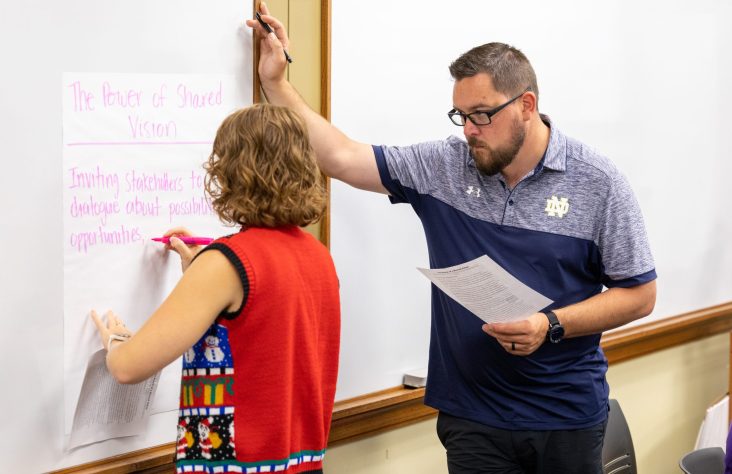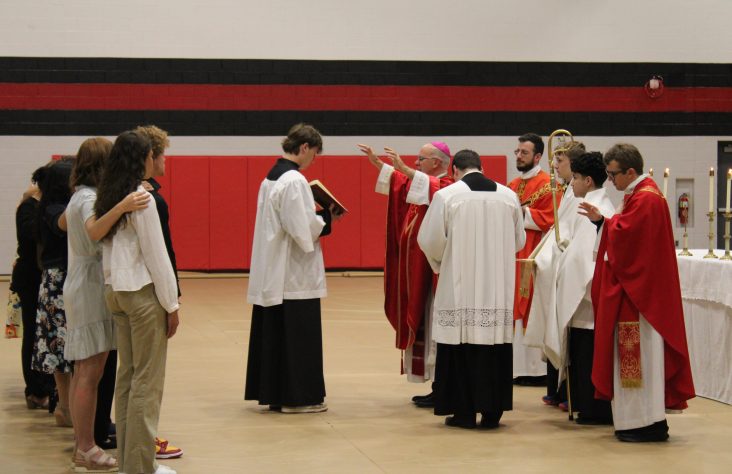August 24, 2021 // Diocese
Next Step Learning invests in diocesan students
Some children find it easy to become readers. For others, it’s much more of a struggle. Letter sounds and simple sight words don’t stick in their minds, and comprehending what they read is yet another challenge. Unsurprisingly, they find no joy in school and don’t read for pleasure.
South Bend residents Peter Staffelbach and Michael Busk, who happen to be cousins, founded Next Step Learning five years ago to help with these challenges. Staffelbach mastered the Lindamood-Bell Sensory-Cognitive Instruction method when he worked at a prominent learning center in Chicago. It uses intensive one-on-one instruction tailored to assessed deficits with great success, even with those who have learning disabilities and special needs. Exercising those underutilized learning muscles can take 100 to 200 hours.

Photos provided by Michael Busk
Michael Busk works with Destiny as part of a sensory-cognitive instruction method developed by Busk and his cousin, Peter Staffelbach, that uses intensive one-on-one or small-group teaching tailored to assessed deficits in reading skills.
Earlier this year, Busk reached out to South Bend-area public and diocesan schools about what Next Step could do for struggling students. He found willing partners at Marshall Elementary School and St. John the Baptist School in South Bend. Contacted at the suggestion of Superintendent Dr. Joseph Brettnacher, St. John principal Brian Carver was enthusiastic. Next Step highly discounted its rate, and the school used Title 1 funding to foot the bill.
Because of COVID-19, University of Notre Dame students who usually spend many hours volunteering in the local community were confined to campus. At an event, Busk met Chris Colda, co-founder of Notre Dame’s honors program, who recruited about 15 of them to learn the method and work with St. John students via Zoom. They targeted seven struggling readers in Maureen Alexander’s combined second/third grade class, pulling them out in groups of two or three for an hour and a half every day.
Group work is a departure from the usual approach; tutors have to work hard to keep each student engaged even when another may be giving the answers. But motivational fun is built into Next Step’s approach.

University of Notre Dame student Ella, on screen, teaches a St. John the Baptist, South Bend, student as part of a sensory-cognitive instruction method developed by Busk and his cousin, Peter Staffelbach, that uses intensive one-on-one or small-group teaching tailored to assessed deficits in reading skills.
Being in a Catholic school setting makes a noticeable difference for the Notre Dame students, according to Busk, whose family attends St. Augustine Parish, South Bend. He cited a humorous example. During one session, a frustrated student said an inappropriate word: All the younger student’s classmates had to do to prompt an apology was point to a statue of Our Lady and say, “She’s watching you.” Scripture verses on the walls also provide a positive environment for the hard work of learning.
Busk is hopeful the program can continue at St. John and expand into other schools. He plans to make a presentation to ACE teachers at Notre Dame for their summer session and to incoming Notre Dame honors students.
During the summer, four St. John learners were able to come into school four mornings a week and work with two tutors, sometimes in person, sometimes online. On one particular morning, the two St. John students, Ethan and Destiny, worked with their tutors for part of the time. When Destiny asserted she hadn’t done anything fun all summer, Busk promised to make the day’s session fun for her. He provided frequent verbal affirmation and kept her attention by alternating writing on a whiteboard, responding to flash cards, using a pencil and worksheet, air writing and picking up stones from the floor for each correct answer. A star card earned candy treats. The students managed to remain focused despite the work school staff were doing all around them to get things ready for the rapidly approaching 2021-22 school year.
The best news. Delivered to your inbox.
Subscribe to our mailing list today.






